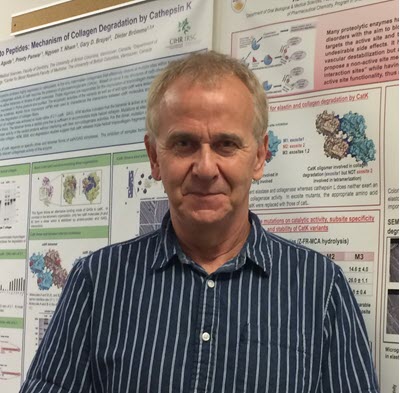
Research Interests
Arthritis / Osteo-Arthritis, Auto-Immune Diseases, Bone Tissue, Proteases, Protein structure and function
Research Focus Teams
TBA
Departments
Biochemistry & Molecular Biology, Oral Biological & Medical Sciences
Contact
Email: dbromme [at] dentistry.ubc.ca
Office Phone: 604–822–1787
Office number: 4558
Publications
Lab Website
Dr. Dieter Brömme is a nationally and internationally recognized biochemist whose main research has been on cysteine proteases, protease inhibitors and the role of cathepsins in human diseases. He is a Canada Research Chair in Proteases and Disease. His research aims to better understand how proteases work, where and when they are produced in the body, how they destroy tissues and how they can be stopped from doing this. His particular interest is focused on a group of proteases called cathepsins, which play a critical role in musculoskeletal, respiratory and cardiovascular diseases.
Many proteases are considered as potential drug targets for a large variety of diseases. By improving the knowledge of how proteases work and finding novel drugs inhibiting proteases, Dr. Brömme’s research could lead to new treatments for degenerative and inflammatory disorders.
Many human diseases are characterized by an excessive proteolytic degradation of proteins of the extracellular matrix (e.g., bone and cartilage diseases, atherosclerosis, destructive lung diseases, cancer) or by an inappropriate proteolytic processing of proteins leading to auto-immune diseases and disorders caused by regulatory defects. Our laboratory is leading in the identification of novel therapeutic targets among intracellular lysosomal proteases and is focused on the role of these proteases in the pathogenesis of rheumatoid arthritis, atherosclerosis and certain forms of immune disorders. Our aim is to understand the role of lysosomal proteases in health and disease which may lead to new therapeutic approaches to treat these illnesses. To achieve our objective, we exploit an interdisciplinary approach which includes methods of molecular biology, enzymology, crystallography, histology, animal models and a wide range of collaborations with clinical and biotech institutions.